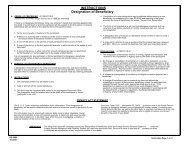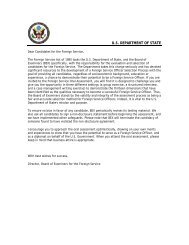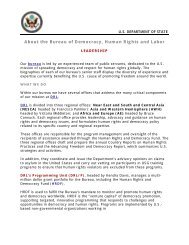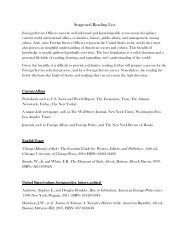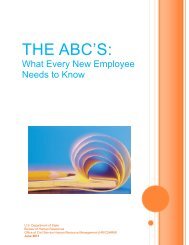Foreign Service Officer: ORAL ASSESSMENT STUDY GUIDE
Foreign Service Officer: ORAL ASSESSMENT STUDY GUIDE
Foreign Service Officer: ORAL ASSESSMENT STUDY GUIDE
Create successful ePaper yourself
Turn your PDF publications into a flip-book with our unique Google optimized e-Paper software.
activity, direction or opinion; to motivate others to participate in the activity one is<br />
leading.<br />
• Judgment. To discern what is appropriate, practical, and realistic in a given situation; to<br />
weigh relative merits of competing demands.<br />
• Objectivity and Integrity. To be fair and honest; to avoid deceit, favoritism, and<br />
discrimination; to present issues frankly and fully, without injecting subjective bias; to<br />
work without letting personal bias prejudice actions.<br />
• Oral Communication. To speak fluently in a concise, grammatically correct, organized,<br />
precise, and persuasive manner; to convey nuances of meaning accurately; to use<br />
appropriate styles of communication to fit the audience and purpose.<br />
• Planning and Organizing. To prioritize and order tasks effectively, to employ a<br />
systematic approach to achieving objectives, to make appropriate use of limited<br />
resources.<br />
• Quantitative Analysis. To identify, compile, analyze, and draw correct conclusions<br />
from pertinent data; to recognize patterns or trends in numerical data; to perform simple<br />
mathematical operations.<br />
• Resourcefulness. To formulate creative alternatives or solutions to resolve problems, to<br />
show flexibility in response to unanticipated circumstances.<br />
• Working With Others. To interact in a constructive, cooperative, and harmonious<br />
manner; to work effectively as a team player; to establish positive relationships and gain<br />
the confidence of others; to use humor as appropriate.<br />
• Written Communication. To write concise, well organized, grammatically correct,<br />
effective and persuasive English in a limited amount of time.<br />
The 13 dimensions are the core of the <strong>Foreign</strong> <strong>Service</strong> Oral Assessment process. Candidates are<br />
encouraged to read the definitions of the 13 dimensions carefully, and to spend some time<br />
thinking about what they mean. While the definition of leadership, for example, may seem<br />
obvious, it is unlikely that the average person in the street would focus on the same aspects of<br />
leadership as those highlighted by the Department’s definition.<br />
Candidates are evaluated solely against these criteria by four assessors who observe the<br />
performance of candidates in a variety of situations designed to enable the candidates to<br />
demonstrate the requisite skills. The assessors are <strong>Foreign</strong> <strong>Service</strong> <strong>Officer</strong>s from various career<br />
tracks with a wide variety of experience in the geographic and functional Bureaus of the<br />
Department. Assessors receive training from professional consultants on how to conduct<br />
assessments in an objective manner in which the candidate’s performance is observed and where<br />
the candidate’s score correlates to an established performance standard.<br />
The Oral Assessment is not an adversarial process. Candidates do not compete against one<br />
another but instead are judged on their capacity to demonstrate skills and abilities necessary to be



